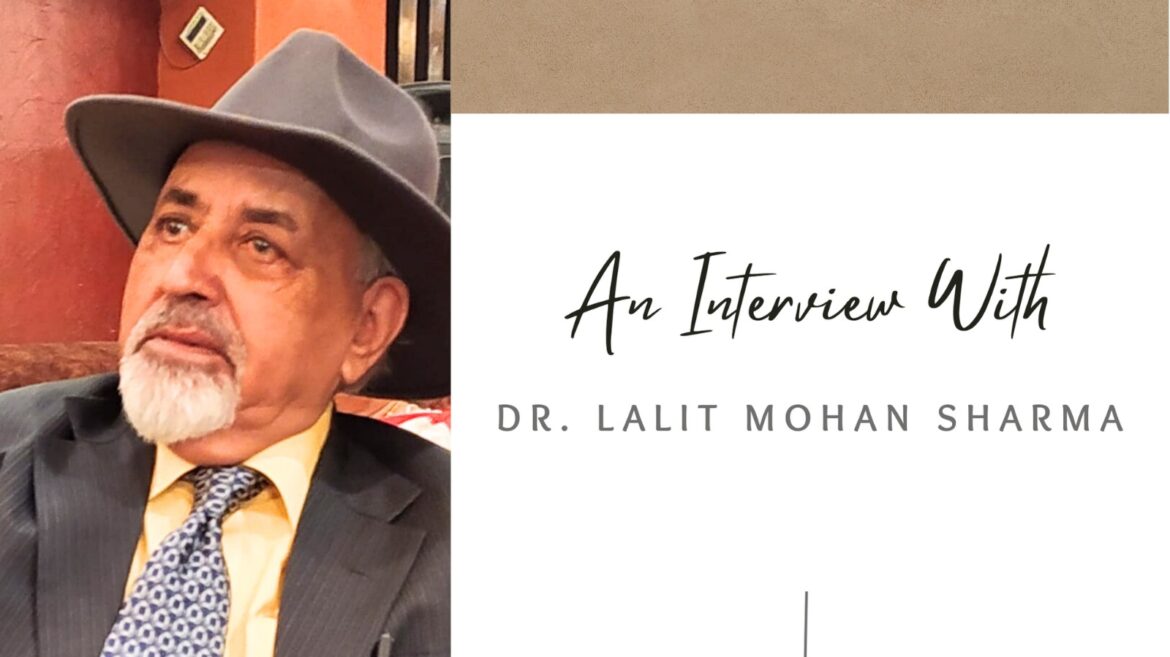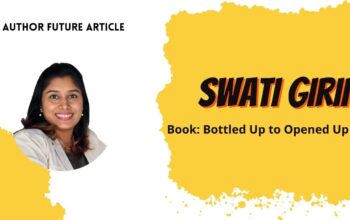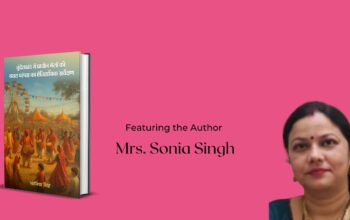The Literature Times: What inspired you to write Inclusive Voids and how does it reflect the current societal dynamics?
Lalit Mohan Sharma: It is butter to the bread of my life. Writing poems, I escape and arrive at emotions, encounter and confront life-situations, attain poise by the creative act to cultivate my responses to everyday life, to convulsions in self and the society as it overwhelms or underwhelms my idea of an individual and human dignity.
The Literature Times: Could you share the creative process behind this collection? Did any particular experience or moment significantly influence your poetry?
Lalit Mohan Sharma: Like everyone else, I have had my share of love denied or fulfilled, and such experiences at a personal, familial or societal level trigger creative processes. The country-wide noises about a new India, the demonising and polarising, cases of lynching and majoritarian victimhood, and acceptance of such a scenario as normal by almost the whole mainland voices or a majority keeping quiet has been most reprehensible, such have deeply hurt and wounded the fabric of harmony and goodwill. My books since 2020, Eyes of Silence, Parables: Fair and Flawed and There’s no death or Imaginary Knots were dominated by poetry expressive of individual response to such a collective mood. But, Icicles of Time and this Inclusive Voids have restored the balance and record reflections as between an individual and the world, no more the strain of political backwaters.
The Literature Times: Your poems explore themes of love, introspection, and societal interactions. How do you balance these diverse themes in your writing?
Lalit Mohan Sharma: Whatever strikes the mind at a given moment, it seizes its occasion, and thereafter mood and language coalesce and carve creative space. At times, love and societal concerns reach out to one another and settle into a synthesis.
The Literature Times: How has your academic background and career in teaching influenced your poetic voice and themes?
Lalit Mohan Sharma: Poets you read and go to again and again help you to seek your own spontaneity. Eliot, Yeats, Keats, Whitman, and of course Shakespeare…such poets keep you grounded, reading Gibran, Rilke…humilityfulfils you. Still, it’s not easy tocultivate critical eye about your own poetry. What needs to be expressed? A tough question.
The Literature Times: What role do you believe poetry plays in bridging the gap between individuality and collective societal experiences?
Lalit Mohan Sharma: Larger good, of society, .. it has been burden of politicians and even statesmen. A poet’s word is hurrah or a lamentation for the world. Poetry expresses individual urges, at times like a rebel, must assert his voice, needs, and in the process also give meaningful expression to what society needs. It is like an individual doing Yajna, the fumes affect the larger people too. Yeats in Second Coming speaks for a whole people. Recently, laws have been changed regarding arrest and FIR. Truth lies in details. Not reforms, if you look closely, it’s for the common citizen of real disadvantage. Cases like Koregaon are dragged, for years no charge-sheet, judgement, let there be judgement. Hang them. You will be shocked to hear the percentage of under-trials in prisons. The State acquires more powers, more stringent. Here you get to the feeling Auden expressed in that elegy on Yeats; Poetry doesn’t make anything happen. Or, it does? Ask Faiz, ask Bismil. Look at Bamkim Chandra’s Vande Matram. Robert Frost attends Presidential inauguration!
The Literature Times: Over the years, you have published extensively in both English and Hindi. How do you decide which language best suits your creative expression?
Lalit Mohan Sharma: Hindi is widely understood, you have kavi- sammelans, any gathering in school or college, Hindi poetry is recited. Urdu is fashionable. Not so with English. At best, you quote an English poet. My first book in 1978 was in Hindi. Kept reading Muktibodh, Ageya, Dhumil, etc, but wrote in English only. The language chooses you. In order to reach a wider audience I did a book Patal Se Prangan Tak in 2023, love and political stuff. I think and talk to myself in English. So what language would I write in?
The Literature Times: You’ve mentioned that vagaries of love inspire your creative zones. How do personal emotions translate into universal truths in your poetry?
Lalit Mohan Sharma: Instead of seeking advice of a therapist, a poet can overcome the trauma and torment, catch it by the locks, and turn it around to create a thing of beauty. Shelley says, our sweetest songs are those that tell of saddest thought. Shakespeare has a character wipe his hand for it smells of mortality. A Poet has the creative faculty to get ‘a civet to sweeten’ his ‘imagination’.
The Literature Times: What has been the most rewarding aspect of your literary journey, from your first book in 1983 to Inclusive Voids in 2025?
Lalit Mohan Sharma: Most rewarding aspect has been my sense of fulfilment in writing poetry, such that even I sometimes wonder if actually I wrote them. When one writes, much more than our conscious self, like suffering vagaries of love or hints of surveillance, yes more than the conscious is involved, thus the personal becomes a statement which is universal. The whole history of mankind, Jung remarked, is ‘born anew in the brain structure of a human being’. One need not read too much into that, yet there’s an iota of truth in that Jungian observation.
The Literature Times: Your association with NGOs shows a commitment to social causes. How has this work impacted your perspective as a poet?
Lalit Mohan Sharma: We receive so much from society, a lot more than we can catalogue. It humbles you no end. We must do some work to return it back to society. A supreme sense of compassion is one of the lessons one learns from Dostoevsky. That finds me active in a couple of NGOs. Especially to give to those from whom you expect nothing!
The Literature Times: What advice would you give to aspiring poets who wish to explore themes of introspection and societal connection in their work?
Lalit Mohan Sharma: Reading a lot of literature, poets, novelists, biographies…this helps. And love the language, feel the sound of words that shall make you a poet. Love language like the woman you love or the man you adore. Not when you have so much to say, just the great feeling to be playing with the sounds. Each language offers you so much. Only you must know how to be on your knees, and beg for understanding.



